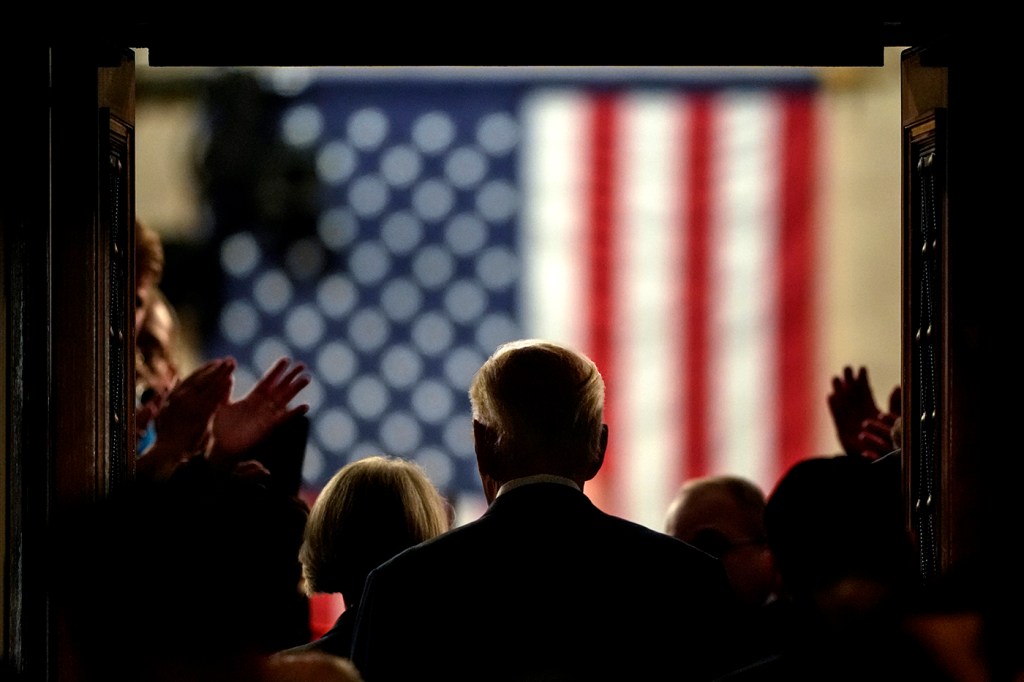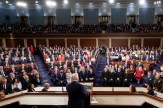State of the Union ‘a win for decency and decorum.’ Republicans keep their composure — at least in the chamber
The 2024 State of the Union address promised to be a raucous campaign-style speech befitting an incumbent president on the comeback trail — and it was.

The State of the Union address promised to be a raucous campaign-style speech befitting an incumbent president on the comeback trail — and it was.
Even taking into account the few sour moments, it fell short of last year’s display of booing and jeering — mostly because of the president’s command over the room, according to Northeastern experts.
President Joe Biden took a fierce tone during Thursday’s speech, urging continued support for Ukraine amid an “international” threat in Vladimir Putin, singling out Donald Trump and his role in the Jan. 6 attacks — even taking shots at Republicans over the failed border bill.
“It was a good speech, forcefully delivered,” says Costas Panagopoulos, head of Northeastern’s political science department.
All in all, Panagopoulos said the occasion was “a win for decency and decorum in the chamber.”
There were a few exceptions.
As Biden was blaming Republicans for killing the border bill, Rep. Marjorie Taylor Greene yelled, “It’s about Laken Riley!”
An undocumented migrant is accused of killing Riley last month.
Rep. Zoe Lofgren, a California democrat, responded by yelling at her to “shut up.”
That back and forth, however, was the lowlight of the night.
“To their credit, Republicans largely kept their composure — at least in the chamber,” he says. “But you could see many of them tapping away on their cellphones, so what they were posting on social media in real time may have been completely different.”
In recent years, the State of the Union address has seemed the perfect venue to witness the nation’s deep political divide in action.
“Political scientists have documented a marked increase in affective polarization, which means that members of one party are more and more likely to dislike members of the other party,” Panagopoulos says.
Ahead of this year’s State of the Union speech — Biden’s final address of his first term — House Speaker Mike Johnson urged his Republican colleagues to keep the peace after last year’s address went off the rails. “We should be professional, we should maintain a high standard of decorum,” he reportedly told members on Wednesday.
In 2023, Biden’s speech was met with boos, jeers and heckles, primarily emanating from a vocal contingent of MAGA Republicans. Kevin McCarthy, then House speaker, tried unsuccessfully to rein in his colleagues (displays of shushing and head-shaking apparently weren’t enough).
Featured Posts
Today’s polarized politics runs deeper than meets the eye. In addition to research showing that many politicians now harbor genuine animosity for their adversaries, Panagopoulos says there are fewer incentives to connect with centrist voters in such a deeply polarized atmosphere.
“There appears to be a decline in civility in politics across the board in recent years, and one explanation might be that elected officials are catering more to their respective bases than they are to moderate and centrist voters who might expect more decorum in return,” Panagopoulos says.
Ruptures in political decorum arguably began during the Obama years, and date even as far back to Bush v. Gore, says Jeremy R. Paul, a professor of law and former dean of the Northeastern University School of Law.
There was the famous “you lie” comment during the 2009 State of the Union address, delivered by President Barack Obama. Rep. Joe Wilson, a South Carolina Republican, was reprimanded by the House of Representatives for the outburst.
Despite this, decorum was mostly still intact.
And then in 2010, Obama criticized the Supreme Court’s Citizens United ruling, a moment that illustrated just how deep tensions ran, Paul says.
“[Obama] was very careful how he phrased it,” Paul says. “Something to the effect of, ‘In my judgment, this decision will open the floodgates to donations from foreign corporations.’ And Justice [Samuel] Alito was very unhappy with that statement, as he was seen sort of muttering under his breath, ‘Not true.’”
Alito has since skipped the annual speech. Paul, an expert on the Supreme Court, says it was an unusual moment under the national spotlight, because the Supreme Court had, until recent years, maintained an “apolitical” posture during such occasions.
“Justice Alito decided he was going to stop attending the State of the Union address because he felt as though the Supreme Court’s justices were sort of sitting ducks,” he says. “Because it is true that the justices are there for open season, and to the extent that the president feels comfortable criticizing their decisions, they’re sort of at a disadvantage.”
That moment represented a change.
“Biden had been urged by some to adopt a more combative style in his speech, and to be more forceful and energetic,” Panagopoulos says.
That could have heightened the likelihood of raucous outbursts, he says.
“The president had to walk a fine line between standing up and fighting for his values and policies, and adopting an approach that can lend itself to compromise and bipartisanship,” Panagopoulos adds.











